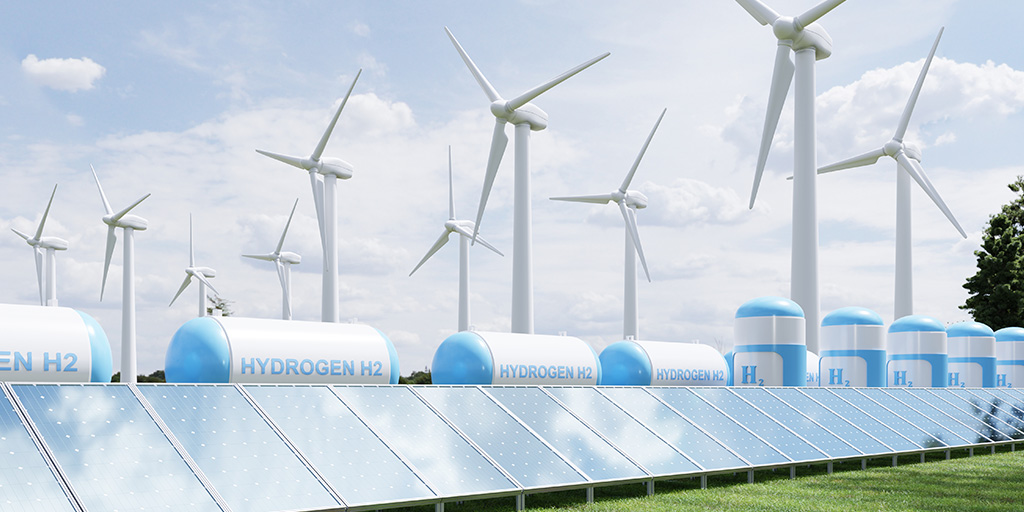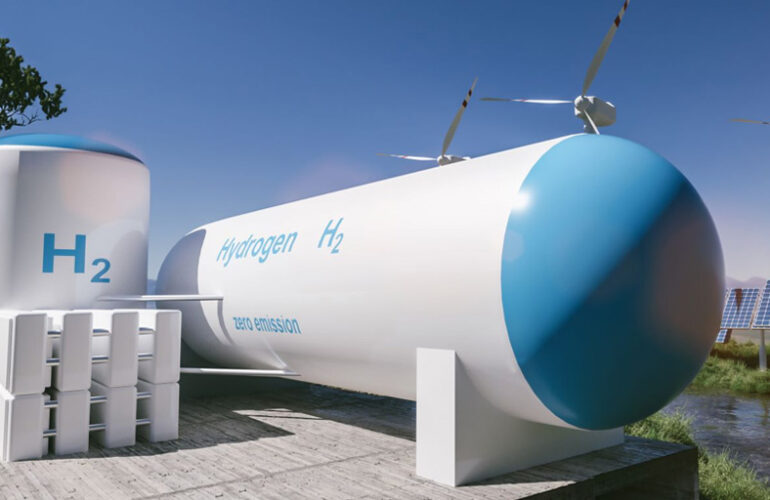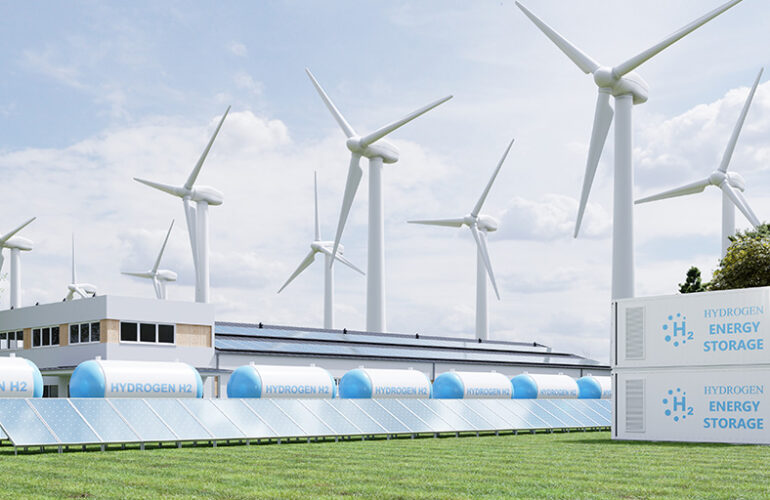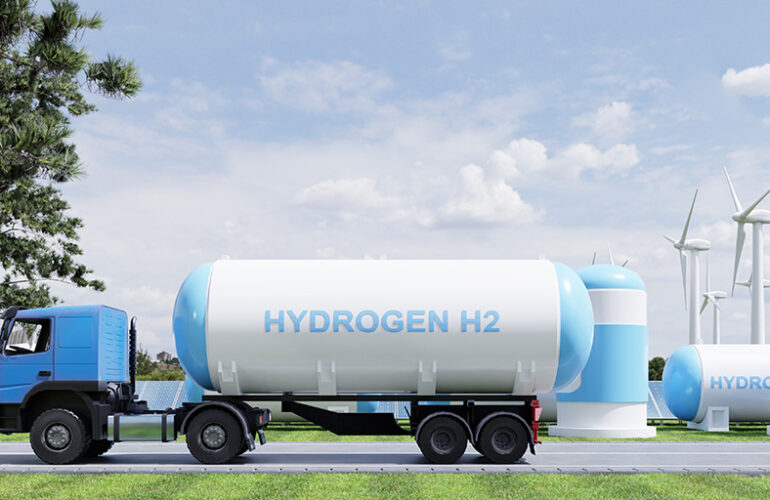INTEGRATION WITH RENEWABLE ENERGY SOURCES
Our technologies enable the integration of hydrogen systems with existing renewable energy installations, such as solar or wind power. The benefits of this integration include:
- Utilization of Excess Energy: The variable production from renewable sources allows surplus energy to be converted into hydrogen, which can be stored and used when energy production is lower.
- Energy Storage Management: Hydrogen can be used to power vehicles, generate electricity, or produce heat, supporting the stability of the energy grid.
- Environmental Protection: Hydrogen production from green energy reduces CO₂ emissions, helping meet global greenhouse gas reduction targets.
Why Choose Us? As a company with years of experience and a commitment to sustainable development, we offer top-quality solutions tailored to the specific needs of clients and local regulatory requirements. Our services include:
- Comprehensive support from design to installation,
- Custom hydrogen storage and production solutions,
- Safe, efficient, and flexible systems that can grow with our clients’ needs.
1. Utilizing Excess Energy as Hydrogen
To address challenges related to the instability of renewable energy sources like solar or wind power, we offer advanced solutions that convert energy surpluses into hydrogen. This process, known as “Power-to-Hydrogen,” enables energy storage in the form of hydrogen, which can later be used during low-production periods, increasing the stability and energy efficiency of renewable-based systems.
Benefits of Using Surplus Energy as Hydrogen
- Efficient Storage of Excess Energy
Surplus energy generated during periods of intense sunlight or strong winds can be converted into hydrogen through electrolysis. This way, energy that might otherwise go unused or be lost is stored in hydrogen form, optimizing resource use and reducing energy waste. - Long-Term Storage
Unlike traditional energy storage systems, which have limited capacity over time, hydrogen offers the ability to store excess energy for extended periods. Stored hydrogen can be used whenever renewable production is low, such as during cloudy days or calm winds, supporting energy stability. - Reducing Grid Load and Stabilizing the Energy System
Converting excess energy to hydrogen helps relieve grid pressure during peak production hours, reducing the risk of system overload and voltage drops. Hydrogen can later be used as backup power, to generate electricity, or to fuel vehicles, enhancing energy flexibility. - Supporting Clean and Low-Emission Solutions
Converting renewable energy surpluses to hydrogen is emission-free, contributing to CO₂ reduction and helping achieve greenhouse gas reduction goals. Hydrogen produced from renewable sources is a fully eco-friendly energy carrier, suitable for a wide range of industrial, transportation, and household applications. - Increasing Energy Independence
Storing surplus energy as hydrogen supports local energy independence, reducing the need for energy imports and stabilizing the local energy system. In particular, hydrogen can be used when energy purchasing costs are high, benefiting users’ energy budgets and reducing dependence on external sources. - Flexible Use
Stored hydrogen can be used in many applications, such as fuel for vehicles, in fuel cells for electricity and heat generation, or as a raw material in industrial processes. This versatility enhances the potential for hydrogen use across a broad range of projects, adapting to current energy needs.
How the Surplus-to-Hydrogen Conversion Process Works?
In this process, surplus electricity powers electrolyzers that split water into hydrogen and oxygen. The hydrogen, acting as an energy carrier, is then stored in compressed, liquid, or chemically bound forms, allowing it to be used whenever needed.
Our solutions fully exploit the potential of renewable energy sources, contributing to a more stable, independent, and sustainable energy infrastructure. Thanks to these solutions, excess energy becomes a valuable resource that can be safely stored and efficiently used in the future.
2. Energy Storage Management Using Hydrogen
Hydrogen, as an energy carrier, offers extensive possibilities for energy storage management, allowing for stable and flexible energy delivery in various forms: to power vehicles, generate electricity, and produce heat. In doing so, hydrogen enhances grid stability and promotes the development of sustainable energy infrastructure. We provide solutions that enable efficient hydrogen energy storage management, supporting a wide range of applications and optimizing performance.
Advantages of Energy Storage Management Using Hydrogen
- Fueling Hydrogen Vehicles
Hydrogen can be stored and later used as fuel for vehicles, including passenger cars, trucks, buses, and trains. Hydrogen fuel cells generate electricity without emissions, making hydrogen an eco-friendly energy source for transportation. Hydrogen-powered transportation not only reduces CO₂ emissions but also increases energy flexibility by using energy surpluses during lower-demand periods. - Electricity Generation for the Energy Grid
Stored hydrogen can be used to generate electricity, supporting grid stability during high-demand periods. Hydrogen stored during renewable energy surplus periods can be converted to electricity through fuel cells or gas turbines. This ensures stable and continuous power to the grid, even under unstable weather conditions. - Heat Production for Industrial and Household Needs
Hydrogen can be used as a heat source in both industry and households. Stored hydrogen surpluses can produce heat directly or through fuel cells, which generate both electricity and heat (cogeneration). This solution is ideal for industries with high heat demands and increases energy efficiency. - Grid Stabilization
Hydrogen storage and flexible use help relieve grid pressure during high-demand periods. Storing hydrogen from excess energy prevents grid overload and stabilizes energy flow, allowing for more efficient use of renewable sources without risking system instability. - Flexibility and Energy Independence
Hydrogen offers energy independence and flexibility, as it can be produced locally from renewable sources and stored on-site. This enables storing energy where it is generated, then using it when and where it is most needed, reducing reliance on external energy suppliers and increasing resilience to price fluctuations and energy stability. - Sustainable Management of Energy Surpluses
Using hydrogen as an energy storage medium enables effective management of renewable energy surpluses, such as solar and wind energy. Hydrogen stored during overproduction can be used later when production is lower, supporting sustainable and optimized renewable resource management.
How Energy Storage Management with Hydrogen Works?
In this storage process, hydrogen is produced through electrolysis during energy surplus periods and then stored in suitable tanks as compressed, liquid, or chemically bound hydrogen. When energy demand arises, hydrogen can be converted to electrical or thermal energy and supplied to the power grid or other utility systems.
Energy storage management using hydrogen is an innovative solution that enhances stability, efficiency, and ecological energy transition. Through our technologies, hydrogen becomes a key element of modern and sustainable energy systems, contributing to greater flexibility and infrastructure resilience against the challenges of renewable energy variability.
3. Environmental Protection with Green Energy Hydrogen
Producing hydrogen using renewable sources, such as solar, wind, or hydropower, is a transformative step toward decarbonization and sustainable development. Hydrogen produced from green energy is completely emission-free, meaning its production does not generate carbon dioxide or other harmful greenhouse gases. This makes hydrogen a vital component of global strategies aimed at reducing emissions and combating climate change.
Environmental Benefits of Using Green Hydrogen
- Zero-Emission Hydrogen Production
Hydrogen produced from renewable energy through electrolysis is completely CO₂-neutral. During water electrolysis, hydrogen and oxygen are separated using electricity without greenhouse gas emissions. This makes hydrogen environmentally friendly and ideal for achieving long-term climate goals. - Emissions Reduction in Transport and Industry
Green hydrogen can replace fossil fuels in hard-to-decarbonize sectors, such as heavy transportation, chemical production, and steel manufacturing. Hydrogen-powered vehicles and industrial processes based on green hydrogen significantly reduce carbon dioxide emissions, helping improve air quality and supporting clean transport and production goals. - Supporting Global GHG Reduction Goals
Using green hydrogen helps countries and companies meet their climate commitments and achieve goals set under the Paris Agreement. Green hydrogen can become a key element of strategies to reduce greenhouse gas emissions, helping to limit global temperature rise to below 1.5°C. - Increasing Renewable Energy Share in the Energy Mix
Green hydrogen enables efficient storage of surpluses from renewable sources like solar and wind energy, which have variable production. Stored hydrogen can be used when renewable output is low, allowing for more efficient and consistent use of renewable energy resources, supporting the green energy transition. - Reducing the Carbon Footprint in Industry and Economy
Transitioning to green hydrogen as an energy source for industry, transport, and energy production lowers the carbon footprint of businesses and economies. Unlike hydrogen produced from fossil fuels (“gray” or “blue” hydrogen), green hydrogen does not require hydrocarbon combustion, eliminating associated emissions. - Supporting Ecosystems and Public Health
Reducing CO₂ and other harmful emissions associated with fossil fuels benefits air quality, positively impacting public health and ecosystems. As a clean fuel, hydrogen reduces harmful chemical emissions, such as nitrogen oxides and particulates, which harm the environment and public health.
Green Hydrogen as a Key Element of Sustainable Development
Producing hydrogen from renewable energy is a key step toward a more sustainable future. As the need to reduce emissions and transition to clean energy grows, green hydrogen offers an effective solution for energy-intensive sectors that cannot easily decarbonize with electricity. Through our green hydrogen production technologies, we support environmental protection and contribute to achieving global climate goals, promoting sustainable development and a clean energy future.

































